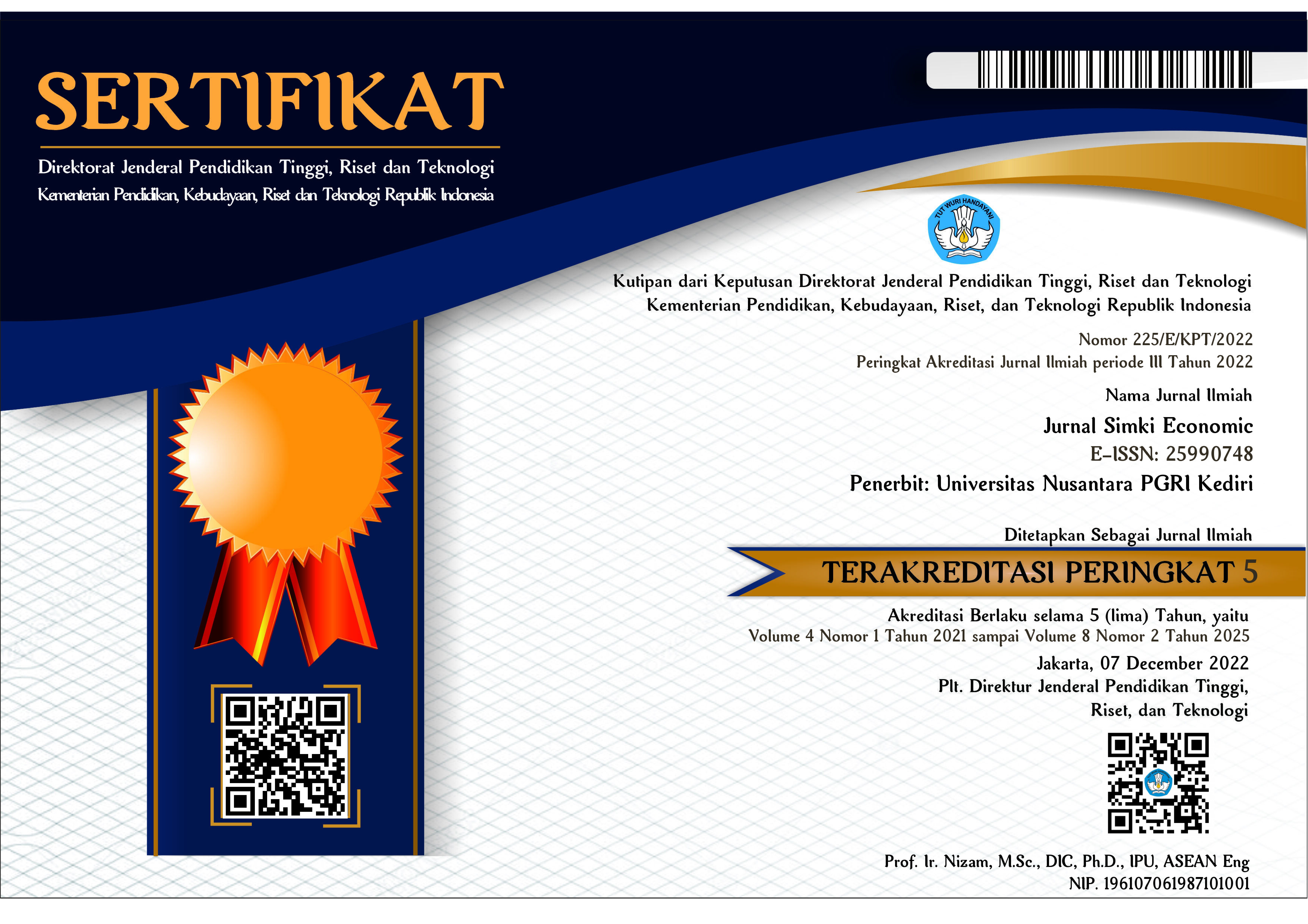Pengaruh Financial Distress, Profitabilitas, dan Leverage terhadap Tax Avoidance pada Perusahaan Sektor Consumer Non-Cyclicals Terdaftar di BEI Periode 2019–2023
 Abstract views: 12
,
Abstract views: 12
,
 PDF (Bahasa Indonesia) downloads: 7
PDF (Bahasa Indonesia) downloads: 7
Abstract
This study aims to examine the effect of financial distress, profitability, and leverage on tax avoidance in consumer non-cyclicals sector companies listed on the Indonesia Stock Exchange (IDX) during the period 2019–2023. Tax avoidance is measured by the effective tax rate (ETR), financial distress is measured by the Springate Score, profitability is measured by return on assets (ROA), and leverage is measured by the debt-to-assets ratio (DAR). This study uses a quantitative method. The sample selection was carried out using a purposive sampling technique and obtained 30 companies as samples. Data analysis was carried out using multiple linear regression with the help of the SPSS program. The results of the study indicate that financial distress, profitability, and leverage have no significant effect on tax avoidance. This finding indicates that these variables are not the main factors influencing tax avoidance practices in the consumer non-cyclicals sector.
Downloads
References
Faradiza, S. A. (2019). Dampak strategi bisnis terhadap penghindaran pajak. Journal of Applied Accounting and Taxation, 4(1), 107–116. https://doi.org/10.30871/jaat.v4i1.1199
Gultom, J. (2021). Pengaruh profitabilitas, leverage, dan likuiditas terhadap tax avoidance. Jurnal Akuntansi Berkelanjutan Indonesia, 4(2), 239–253. https://doi.org/10.32493/JABI.v4i2.y2021.p239-253
Hermawan, R., & Aryati, T. (2022). Pengaruh Financial Distress dan Corporate Governance terhadap Tax Avoidance. Jurnal Ekonomi Trisakti, 2(2), 381–394. https://doi.org/10.25105/jet.v2i2.14138
Jensen, M. C. , & M. W. H. (1976). Theory of The Firm: Managerial Behavior, Agency Cost and Ownership Structure. Journal of Financial Economics, 3, 305–360. https://doi.org/10.1016/0304-405X(76)90026-X
Lukito, D. P., & Sandra, A. (2021). Pengaruh Capital Intensity, Profitabilitas, Dan Financial Distress Terhadap Tax Avoidance. Jurnal Akuntansi, 10(2), 114–125. https://doi.org/10.46806/ja.v10i2.803
Monika, C. M., & Noviari, N. (2021). The effects of financial distress, capital intensity, and audit quality on tax avoidance. American Journal of Humanities and Social Sciences Research (AJHSSR), 5(6), 282–287. https://www.ajhssr.com/wp-content/uploads/2021/06/ZL2156282287.pdf
Permata, S. F. I., Nugroho, R., & Muamarah, H. S. (2021). Pengaruh Financial Distress, Manajemen Laba Dan Kecakapan Manajemen Terhadap Agresivitas Pajak. INFO ARTHA, 5(2), 93–107. https://jurnal.pknstan.ac.id/index.php/JIA/article/view/1377
Putri, W. A., & Halmawati, H. (2023). Pengaruh Profitabilitas, Leverage, dan Tata Kelola Perusahaan terhadap Tax Avoidance: Studi Empiris Perusahaan Pertambangan yang Terdaftar di Bursa Efek Indonesia. Jurnal Eksplorasi Akuntansi, 5(1), 176–192. https://doi.org/10.24036/jea.v5i1.701
Rosa, H. F., Hartono, A., & Ulfah, I. F. (2022). Pengaruh Return On Asset (ROA), Leverage, dan Intensitas Modal Terhadap Penghindaran Pajak (Tax Avoidance). Jurnal Ekonomi Syariah Darussalam, 3(1), 18–33. https://ejournal.iaida.ac.id/index.php/JESDar/article/view/1146
Santo, V. A., & Nastiti, C. D. (2023). Pengaruh financial distress, leverage dan capital insenty terhadap tax avoidance. AKURASI: Jurnal Riset Akuntansi Dan Keuangan, 5(1), 1–10. https://doi.org/10.36407/akurasi.v5i1.848
Selistiaweni, S., Arieftiara, D., & Samin, S. (2020). Pengaruh kepemilikan keluarga, financial distress dan thin capitalization terhadap penghindaran pajak. Prosiding BIEMA (Business Management, Economic, and Accounting National Seminar), 1, 751–763. https://conference.upnvj.ac.id/index.php/biema/article/view/925
Sugiyono. (2018). Metode Penelitian Pendidikan: Pendekatan Kuantitatif, Kualitatif, dan R&D. Alfabeta.
Thoha, M. N. F., & Wati, Y. E. (2021). Pengaruh Leverage, Likuiditas, Ukuran Perusahaan, Dan Profitabilitas Terhadap Tax Avoidance. Jurnal Ekonomika Dan Manajemen Vol, 10(2), 139. https://doi.org/10.36080/jem.v10i2.1781
Uliganda, R. M., & Hermi, H. (2024). Pengaruh Financial Distress, Intensitas Asset Tetap dan Sales Growth pada Tax Avoidance pada Perusahaan Consumer Non-Cyclicals Sub Sektor Food and Beverage Tahun 2019-2022. AKADEMIK: Jurnal Mahasiswa Ekonomi & Bisnis, 4(3), 1523–1536. https://doi.org/10.37481/jmeb.v4i3.953
Yunus, M. I. D., Fala, D. Y. A. S., & Hormati, A. (2024). Pengaruh Financial Distress, Politicall Connection, Foreign Activty, dan Audit Committee Terhadap Tax Avoidance. Bongaya Journal of Research in Accounting (BJRA), 7(1), 80–88. https://doi.org/10.37888/bjra.v7i1.508
Copyright (c) 2025 Dede Egi Hidayat, Dani Sopian

This work is licensed under a Creative Commons Attribution 4.0 International License.














